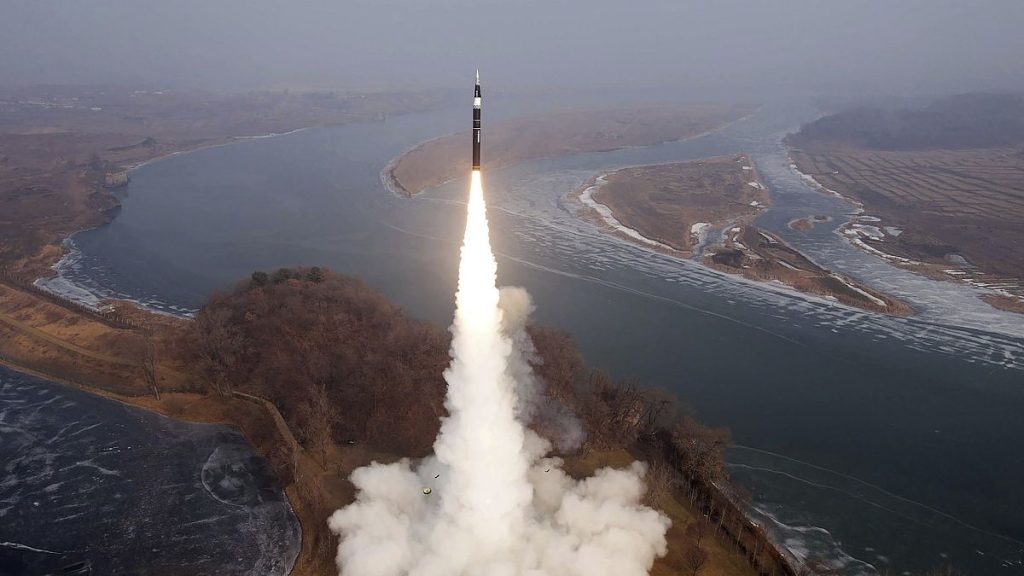North Korea’s recent test of a hypersonic missile has escalated tensions in the Pacific region and sparked international concern. The missile launch, which occurred while US Secretary of State Antony Blinken was in Seoul for discussions with South Korean officials, underscores the growing complexity of the geopolitical landscape and the challenges posed by North Korea’s advancing weapons program. North Korean state media reported that the missile, launched from a site near Pyongyang, traveled 1,500 kilometers at Mach 12, hitting a target in the sea. However, South Korean authorities disputed these claims, suggesting a shorter flight distance and a different trajectory. North Korean leader Kim Jong-un, who observed the launch, stated that the new hypersonic missile is part of his strategy to develop an insurmountable arsenal for defensive purposes. He emphasized the weapon’s ability to “reliably contain any rivals in the Pacific region” that pose a threat to North Korea’s security.
The timing of the missile test, just weeks before the US presidential transition, carries significant political implications. It coincides with increasing concerns about the burgeoning alliance between North Korea and Russia. Secretary Blinken, during his visit to Seoul, voiced alarm over this deepening partnership, describing it as a mutually beneficial arrangement. Reports suggest that North Korea has deployed thousands of troops to support Russia’s military efforts in Ukraine, particularly in the Kursk region where Ukrainian forces launched a counteroffensive. In return, Russia is allegedly providing North Korea with advanced space and satellite technology, a development that raises concerns about the potential proliferation of sensitive technologies. Blinken further warned that Russia might reconsider its long-standing opposition to North Korea’s nuclear program, a shift that could significantly destabilize the region.
The missile test and the strengthening North Korea-Russia alliance come at a delicate time for South Korea, which has been grappling with internal political turmoil. South Korean President Yoon Suk-yeol’s recent declaration of martial law, subsequently overturned by parliament, has created uncertainty and raised questions about political stability. While acknowledging concerns about the situation in South Korea, Secretary Blinken expressed confidence in the resilience of South Korean democracy and its institutions. He emphasized the importance of resolving internal differences peacefully and in accordance with the rule of law.
The hypersonic missile test is just the latest in a series of provocative actions by North Korea, which has steadily advanced its weapons capabilities despite international sanctions and condemnation. The development and deployment of hypersonic missiles, which are difficult to intercept due to their speed and maneuverability, pose a significant threat to regional security. This test further complicates efforts to denuclearize the Korean peninsula and underscores the need for a concerted international response. The escalating tensions and the evolving dynamics between North Korea, Russia, and other regional actors highlight the increasingly complex security challenges facing the international community.
The deepening relationship between North Korea and Russia represents a significant shift in the geopolitical landscape, adding a new layer of complexity to an already volatile region. The alleged exchange of North Korean troops for Russian technology raises serious concerns about the potential for further military escalation and the proliferation of advanced weapons systems. This cooperation not only undermines international efforts to isolate North Korea but also provides Russia with a potential ally in its ongoing conflict with Ukraine. The potential for Russia to recognize North Korea’s nuclear program is a particularly alarming prospect, as it could further destabilize the region and encourage other countries to pursue nuclear weapons.
Moving forward, the international community faces the difficult task of managing the growing threat posed by North Korea’s advancing missile program and its deepening ties with Russia. The need for a unified and decisive response is more urgent than ever. Continued diplomatic efforts, coupled with strengthened sanctions and enhanced military deterrence, will be crucial in addressing this evolving security challenge. The stability of the Korean peninsula and the broader Pacific region hinges on the ability of the international community to effectively address the challenges posed by North Korea’s pursuit of advanced weapons systems and its increasingly close relationship with Russia.














